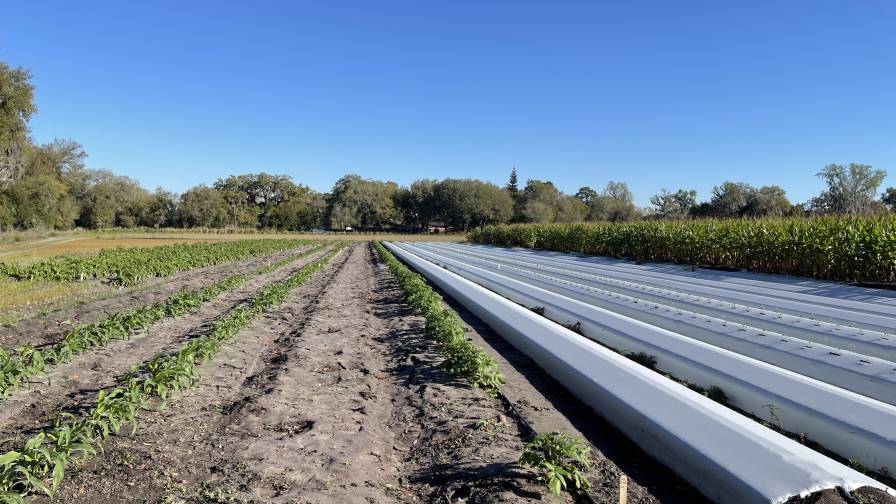2009 ERA National Winner: Ingrained In The Environment
The Wabash Valley Service Co.’s Browns, IL, outlet is the 2009 National DuPont Environmental Respect Award Winner. A panel of expert judges selected the Wabash Valley winner from among entries received in this, the 19th year of competition.
The Browns facility is spread over 10 acres and includes the latest in physical plant design and technology to ensure an environmentally friendly operation. This full-service farm supply business has 34 employees who continually receive safety updates and training. Training includes an annual company-wide Safety Fair where participants cover everything from hazardous communication to dealing with community methamphetamine issues.
“We spend a lot of time training on safety and environmental stewardship,” says Mike Wilson, Webster Valley Service Center area marketing coordinator. “Every applicator who leaves this plant with a piece of equipment knows that they are the last word. If they get to the field and something is not right, they are trained to return and not continue the application.”
Each year local volunteer fire departments are invited to train on the Wabash Valley site. Browns employee Eric Shaw is a volunteer fireman for a local fire department and coordinates on-site training about the proper fire-emergency procedures for the products stored on the site.
“We also provide third-party training for all professional applicators in the company,” says Wilson. “The training is held in the spring and fall and includes calibration, weed identification, nozzle selection, spray and mix logs, and information about insurance claims.” The Wabash Valley application rigs are equipped with autosteer and multiple section boom shut-off controlled by computer mapping. “Our rigs have as-applied software that is great backup should there be any claims concerning our application accuracy,” he says.
“Technology has just made us more educated when it comes to making fertilizer and crop protection recommendations,” explains Wilson, a certified crop advisor (CCA). The Browns location employs six CCAs and depends on field scouting and integrated pest management to make product recommendations. “We do a lot of work overlaying yield maps with fertility maps,” he says. “If you use a yield map that says you took 200-bushel corn off an area, then experience tells you to replace the phosphate based upon that yield level. But when we overlay a soil test map over the yield map we often discover there is still plenty of available phosphate. We think we save the customer money and help protect the environment from overapplication.”
A New Facility
The award-winning facility was built from the ground up beginning in 2003. “We built this location one section at a time,” says Wilson. “We looked at maintaining environmental responsibility at every single step. Even the feed and seed warehouse is curbed and contained just in case we want to use it for another purpose down the road,” he says.
The liquid load-out building is equipped with a firewall in the ceiling and contains many fail-safe features for fire protection. “We’ve installed video monitoring with nine cameras and recording capabilities. The cameras may be accessed by any computer with a password on the Internet,” says Wilson.
The Wabash Valley load-out building maintains two large water tanks connected to the local water system. The tanks are fed by a 2-inch line, and a unique system of photo sensors protects against any chance of back siphoning. The building contains 12 4,300-gallon tanks and a computerized mixing system. The load-out area is designed for fast and safe turnaround of sprayers and nurse trucks. The modern dry fertilizer blending system eliminates fertilizer dust in the atmosphere. “We can blend 750 ton per day,” says Wilson. “We go through about 15,000 tons each fiscal year. The anhydrous load-out area includes two 18,000-gallon storage tanks.
“We are doing the right thing with our containment system,” says Wilson. “But every dealership has got to be doing the right thing or they aren’t going to be in business very long. Every business needs to do the right thing with equipment too, or they won’t be in business very long.
“What separates the good companies from the really good companies is what we are doing with people,” says Wilson. “It really boils down to people — employees, customers, and the community. If we do the right things with people, we are going to be successful.”
Wabash Valley is committed to helping people understand the effort it takes to feed and clothe the nation.
“Many of the employees at Browns are involved in the community, mostly through Farm Bureau’s Agriculture in the Classroom program. They also serve on the local fair board, school board, as 4-H leaders, mentors in school programs, and in their local churches. As a company we donate money to support these programs and individuals,” he adds.
Wabash Valley employees are involved in civic organizations such as the Rotary. They are encouraged to speak about the industry and educate adult audiences on the methamphetamine problems that plague agriculture and public health.
“The message we carry is one of environmental stewardship; if we are to continue to feed ourselves and the world, we must protect our most vital resource, the land,” says Wilson.





